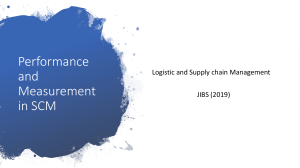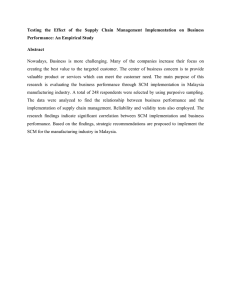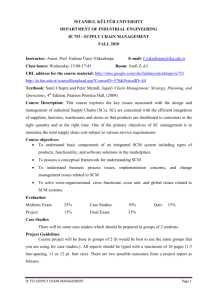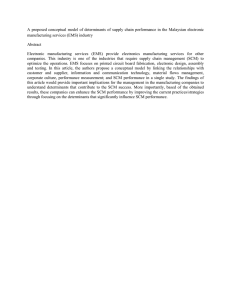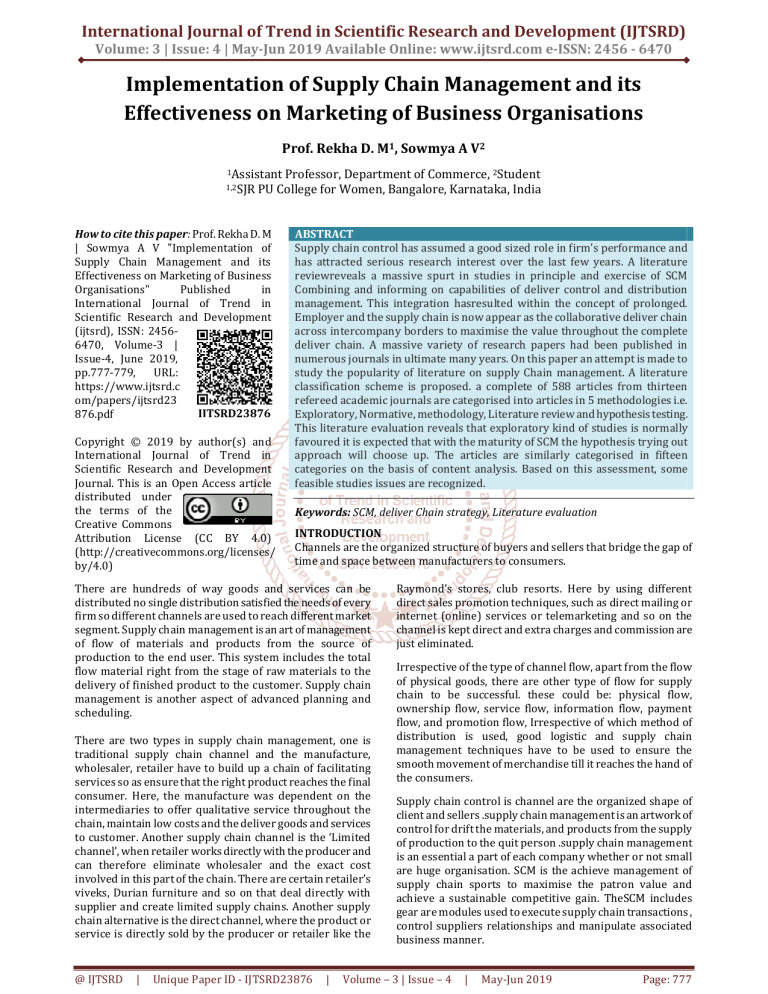
International Journal of Trend in Scientific Research and Development (IJTSRD)
Volume: 3 | Issue: 4 | May-Jun 2019 Available Online: www.ijtsrd.com e-ISSN: 2456 - 6470
Implementation of Supply Chain Management and its
Effectiveness on Marketing of Business Organisations
Prof. Rekha D. M1, Sowmya A V2
1Assistant
Professor, Department of Commerce, 2Student
1,2SJR PU College for Women, Bangalore, Karnataka, India
How to cite this paper: Prof. Rekha D. M
| Sowmya A V "Implementation of
Supply Chain Management and its
Effectiveness on Marketing of Business
Organisations"
Published
in
International Journal of Trend in
Scientific Research and Development
(ijtsrd), ISSN: 24566470, Volume-3 |
Issue-4, June 2019,
pp.777-779,
URL:
https://www.ijtsrd.c
om/papers/ijtsrd23
IJTSRD23876
876.pdf
Copyright © 2019 by author(s) and
International Journal of Trend in
Scientific Research and Development
Journal. This is an Open Access article
distributed under
the terms of the
Creative Commons
Attribution License (CC BY 4.0)
(http://creativecommons.org/licenses/
by/4.0)
ABSTRACT
Supply chain control has assumed a good sized role in firm's performance and
has attracted serious research interest over the last few years. A literature
reviewreveals a massive spurt in studies in principle and exercise of SCM
Combining and informing on capabilities of deliver control and distribution
management. This integration hasresulted within the concept of prolonged.
Employer and the supply chain is now appear as the collaborative deliver chain
across intercompany borders to maximise the value throughout the complete
deliver chain. A massive variety of research papers had been published in
numerous journals in ultimate many years. On this paper an attempt is made to
study the popularity of literature on supply Chain management. A literature
classification scheme is proposed. a complete of 588 articles from thirteen
refereed academic journals are categorised into articles in 5 methodologies i.e.
Exploratory, Normative, methodology, Literature review and hypothesis testing.
This literature evaluation reveals that exploratory kind of studies is normally
favoured it is expected that with the maturity of SCM the hypothesis trying out
approach will choose up. The articles are similarly categorised in fifteen
categories on the basis of content analysis. Based on this assessment, some
feasible studies issues are recognized.
Keywords: SCM, deliver Chain strategy, Literature evaluation
INTRODUCTION
Channels are the organized structure of buyers and sellers that bridge the gap of
time and space between manufacturers to consumers.
There are hundreds of way goods and services can be
distributed no single distribution satisfied the needs of every
firm so different channels are used to reach different market
segment. Supply chain management is an art of management
of flow of materials and products from the source of
production to the end user. This system includes the total
flow material right from the stage of raw materials to the
delivery of finished product to the customer. Supply chain
management is another aspect of advanced planning and
scheduling.
There are two types in supply chain management, one is
traditional supply chain channel and the manufacture,
wholesaler, retailer have to build up a chain of facilitating
services so as ensure that the right product reaches the final
consumer. Here, the manufacture was dependent on the
intermediaries to offer qualitative service throughout the
chain, maintain low costs and the deliver goods and services
to customer. Another supply chain channel is the ‘Limited
channel’, when retailer works directly with the producer and
can therefore eliminate wholesaler and the exact cost
involved in this part of the chain. There are certain retailer’s
viveks, Durian furniture and so on that deal directly with
supplier and create limited supply chains. Another supply
chain alternative is the direct channel, where the product or
service is directly sold by the producer or retailer like the
@ IJTSRD
|
Unique Paper ID - IJTSRD23876
|
Raymond’s stores, club resorts. Here by using different
direct sales promotion techniques, such as direct mailing or
internet (online) services or telemarketing and so on the
channel is kept direct and extra charges and commission are
just eliminated.
Irrespective of the type of channel flow, apart from the flow
of physical goods, there are other type of flow for supply
chain to be successful. these could be: physical flow,
ownership flow, service flow, information flow, payment
flow, and promotion flow, Irrespective of which method of
distribution is used, good logistic and supply chain
management techniques have to be used to ensure the
smooth movement of merchandise till it reaches the hand of
the consumers.
Supply chain control is channel are the organized shape of
client and sellers .supply chain management is an artwork of
control for drift the materials, and products from the supply
of production to the quit person .supply chain management
is an essential a part of each company whether or not small
are huge organisation. SCM is the achieve management of
supply chain sports to maximise the patron value and
achieve a sustainable competitive gain. TheSCM includes
gear are modules used to execute supply chain transactions ,
control suppliers relationships and manipulate associated
business manner.
Volume – 3 | Issue – 4
|
May-Jun 2019
Page: 777
International Journal of Trend in Scientific Research and Development (IJTSRD) @ www.ijtsrd.com eISSN: 2456-6470
REVIEW OF LITERETURE:
Iyatullah, RnaakeshNarain, Amar Singh (2015) conducted
research study which was aimed to provide insight into the
similarities and dissimilarities of supply chain management
practices between large enterprises and small and medium
enterprises of India. Study found that despite of so many
constraints, the managers of the SMEs need to bring in a
cultural change in their attitude needed to outlive and
outperform other firms existing at every tier of supply chains
of LEs. If only SMEs could focus on better strategic planning
and management of their businesses and not just only on
economic aspects, they could reap much more dividends.
Kiran Bala (2014) conducted a study which was aimed to
understand what supply chain management is and how it is
affecting organization, what are different challenges and it
can be proved as a tool for improving overall performance in
today’s global competitive environment. They concluded that
assessing supply chain performance leads to identification of
problems and opportunities, having a strategy and
measuring key parts are necessary to understand and take
control of supply chain.
T.N Varma,D.A Khan(2014) studied use of information
technology in supply chain management in which he
discusses the role of IT as an enabler in supply chain
management with vast benefits to organizations with a
comprehensive IT implementation as well as curbing e-risks.
Wong, Lai & Cheng (2011-12) in their study on Value of
Information Integration to Supply Chain Management, under
what circumstances does information integration contribute
to better performance outcomes in supply chain
management (SCM). The study provides managers with
empirical insights on the effects of information integration
on the cost and customer-oriented operational performance
of SCM under favourable and unfavourable environmental
conditions.
V. M Rao Tummala,TobiasSchoenherr(2008) conducted
study which aims to facilitate the task by developing an
implementation decision framework for SCM initiatives
based on best practices and reveals the framework consists
of SCM goals, enablers, SCM initiatives and the defining
operational activities which will enable firms to develop and
implement SCM plans logically and in systematic fashion.
Furthermore the framework can be used with analytic
hierarchy process modeling process to systematically
prioritize the SCM plans for effective implementation by
companies.
According to Thatte, (2007) the sub-constructs for supply
chain responsiveness includes operation system
responsiveness, logistic process responsiveness and supplier
network responsiveness. Operation system responsiveness
is the ability of firm’s manufacturing system to address
changes in customers demand. It includes both
manufacturing and service operations.
Jonathan D linton ,et.al.,(2007)-Sustainable supply chains
an introduction-journal of operations management25(6) ,
1075-1082,2007 - The focus on environmental management
and operation is moved from local optimisation of
environmental factors to consideration of the entire supply
chain during the production, consumption, customer service
and post disposal disposition of product.
@ IJTSRD
|
Unique Paper ID - IJTSRD23876
|
Responsiveness is the ability of firm’s manufacturing system
to address changes in customer demand. Its includes both
manufacturing and service operation.
Angerhofer& Angelides (2006): discuss levels of
collaboration that could be undertaken in a supply chain:
strategic, managerial, and operational. The researcher
collaborates at the operational level in transportation
scheduling. By working with retailers, suppliers could
improve delivery performance through sharing of stock
levels. Collaboration at the managerial level could result in
better planning and increased forecast accuracy. At the
strategic level, collaboration could result in capital
investment to improve the supply chain. The author has
discussed the supply chain only through levels and has
concentrated on levels of stock and capital investment as
major criteria. The researcher 85 analyses that only cost or
financial performances are not the vital element constituting
the supply chain performance.
Kim, Chatfield, Harrison &Hayya (2006), suggests a set of
best organization structures for efficient supply chain
management. It derives organization types for supply chain
management according to the formalization and
centralization level of an independent department
responsible for supply chain management (SCM) activities,
and hierarchical relationship in organizational position and
operational responsibility between the SCM department and
other functional departments. the SCM department
maintains an adequate level of balance and harmony with
other functional departments.
Sengupta, Kaushik (2006), supply chain research focuses
exclusively on the manufacturing sector. To address the
deficiency, this research article compares the effect of
traditional manufacturing-oriented supply chain strategies
on the operational and financial performance of firms in both
service and manufacturing sectors. This study defines
organizational performance through operational results and
financial results as measured by the respondents' perceived
performance. Financial performance is measured by the
company's relative cost and profit-related performance
compared with its direct competitors.
Chen and Paulraj (2004):Supply chain management is not
only limited to logistics activities and planning and control of
materials and information flow internally within the
company or externally between companies. It also deals with
the strategic decisions such as inter-organizational issues,
alternative organizational form to vertical integration. It is
also the management of relationship between suppliers and
customers.
Ulf Paulsson(2004): supply chain risk management-journal
of supply chain risk,79-96,2004-The chin of transport and
storage activates from first supplier to end customer has
during g the years changed character and gradually
developed, from a stepwise chain via a logistical chain into a
supply chain the number and charter of the risk and the total
risk exposure changes as the chain changes.
ANALYSIS
Organisational performance evaluation can be done
through proper implementation of supply chain
management practices ,in the study also it represents
Volume – 3 | Issue – 4
|
May-Jun 2019
Page: 778
International Journal of Trend in Scientific Research and Development (IJTSRD) @ www.ijtsrd.com eISSN: 2456-6470
that performance evaluation can be easily focus supply
chain practices based on good relationship with
suppliers company can also focus on its brand image
customers loyalty towards organisational products and
services.
Effective supply chain leads to good relationship with
customers. Which always helps in maintaining high
quality production and services, this also in turn it also
helps to balance the demand and supply in market. Since
there is good relationship company and customers,
company can focus on its requirements.
Organisation policy leads to proper improvement of the
supply chain process therefore organisation policy
should be in favour of implementing with it advance
technology. Has it helps to smooth flow of operations.
Operationally it is proved that proper supply chain
strategy will always increase sales and it leads to better
growth. Which also have a better working condition in
supply chain management logistics, Which focus on
expansion distribution channel and also helps in proper
decision making.
CONCLUSION
Supply chain management is very important for every
organisation to maximize customer loyalty and to achieve
competitive advantage. It is very important are an
organisation to implement process are sequence in
distribute goods and services ultimate users.
Companies’ capability and profitability through proper
channel like supply chain always lead to companies’ growth.
Supply chain management can lower operational expenses
with proper planning from manufacturering to
transportation. Since it is back bone of organisation which
manages critical issues and also leads to growth of
organisation through competitive advantage and increase of
customers.
REFERNCES:
[1] Handfield R. B. and Nichols E. L., “Introduction to
Supply Chain Management”, Prentice-Hall, New Jersey,
1999,pp. 1-183. Jüttner U., Christopher M. and Baker S.,
“Demand chain management-integrating marketing
and supply chain management”, Industrial Marketing
Management, (36: 3). 2007.
@ IJTSRD
|
Unique Paper ID - IJTSRD23876
|
[2] Sandelands E. "Building Supply Chain Relationships,”
International Journal of Physical Distribution and
Logistics Management, (24: 3), 1994, pp. 43-44.
Sanders N. R., Locke A., Moore C. B. and Autry C. W., “A
Multidimensional Framework for Understanding
Outsourcing Arrangements”, The Journal of Supply
Chain Management, (43: 4), 2007.
[3] Scott C. and Westbrook R., "New Strategic Tools for
Supply Chain Management, "International Journal of
Physical Distribution & Logistics Management, (21: 1),
1991, pp. Hunt, S. D., & Davis, D. F. (2008).
Grounding supply chain management in resourceadvantage theory. Journal of Supply Chain
Management,44(1), 10–21
[4] Wisner J. D. And K. C. Tan. “Supply Chain Management
and Its Impact on Purchasing,” The Journal of Supply
Chain Management, (36: 4), 2000, pp. 33-42.
[5] D. Power, “Supply chain management integration and
implementation: a literature review,” Supply Chain
Management: An International Journal, vol. 10, no. 4,
pp. 252-263, 2005.
[6] D. Twigg, “Managing product development within a
design chain,” International Journal of Operations &
Production Management, vol. 18, no. 5, pp. 508-24,
1998.
[7] R. B. Handfield, G. L Ragatz, K. J. Petersen, and R. M.
Monczka, “Involving suppliers in new product
development,” California Management Review, vol. 42,
no. 1, pp. 59-82, 1999.
[8] D. C. Juran and H. Dershin, “Lessons in supply chain
assessment and improvement,” Quality Focus, vol. 4,
no. 1, pp. 18-27, 2000. [46] D. F. Ross, Competing
Through Supply Chain Management, Chapman & Hall,
New York, N.Y,1998.
[9] Logistics and Supply Chain Management by Martin
Christopher
[10] Supply Chain Management: Strategy, Planning, and
Operation by Sunil Chopra
[11] text books relating to Bangalore university
Volume – 3 | Issue – 4
|
May-Jun 2019
Page: 779

